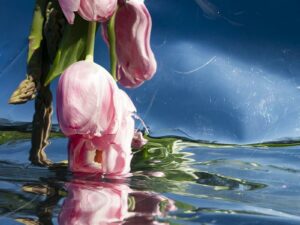It can feel at times like we’ve seen too much of 2020. During the year in which the Covid-19 pandemic took hold, mainstream media was awash with images of empty cityscapes, exhausted ICU workers and hand-painted rainbows in windows. These images pointed to resilience and hope. But over time they felt cliched, no longer adequate to reflect the nuance and complexity of an unfolding reality. Published by teNeues, Prix Pictet’s book Confinement offers a bold and original visual counterpoint, presenting responses to the pandemic through the eyes of 43 artists.
Prix Pictet, like other photographic prizes, was forced to pause its physical activities. Instead, the award presented the 2019 exhibition, Hope, as a virtual walk-through. The seed for this book was planted when the prize collaborated on a commission with The Guardian’s director of photography Fiona Shields, featuring four previous winners – Nadav Kander, Alexia Webster, Rena Effendi and Rinko Kwauchi. This was subsequently opened to the more than 90 photographers who have been shortlisted for the international award. Since its inception in 2008, Prix Pictet has rewarded photography that shines a light on issues of sustainability.
Animal-borne infections like Covid-19 – and Ebola and Sars before it – have been linked to environmental degradation. The destruction of natural habitats through profit-driven activities such as logging, mining, road building and the wildlife trade has brought humans into closer contact with animal species. As the Ugandan writer Jennifer Nansubuga Makumbi puts it in her powerful essay for Confinement, which explores the pandemic through a post-colonial lens, “What [Covid-19] has done effectively is bring to the centred world the fact that humanity is part of nature, that nature has creative ways of regulating itself. It is saying, ‘Humans, be warned.’”

Mineral Ship (2020), a composite multi-spectral satellite image revealing deforestation of the Amazon by Richard Mosse (b. 1980) addresses this environmental aspect directly. The shot is aesthetically captivating upon first impression – all azure blues and rusty reds. But this belies a sinister story of toxic air pollution and crop stress; the work maps these factors in detail using photogrammetry and geographic system software. Stéphane Couturier (b.1957), meanwhile, looks at the pandemic in terms of economic sustainability, photographing the suddenly hollowed out office buildings of Brasilia’s banking sector. With its primary colours and abstract take on architectural forms, his image, Nouveaux Constructeurs #6 (2020), is inspired by modernist painter Fernand Léger.
Other artists draw attention to the human dimension. The portraiture of Nyaba Leon Ouedraogo (b.1978) employs brightly coloured masks and other objects from his homeland of Burkina Faso against semi-hidden figures. It’s a visual metaphor for the transformational quality of art, and a way of transcending the bodily experience. For Nadav Kander, (b.1961) the solitude of lockdown represented an impediment and an opportunity. In Kander’s Solitude-Quietude-Contemplation (2020) figures are pictured in a sparse frame, alone with thoughts that hopefully lead to a revelation about our collective responsibility to other humans and the ecosystems we inhabit.
In some countries it might seem like the pandemic is in retreat but globally it continues to rage, with tragic consequences. And all the while the threat of climate change looms. In his essay, The Year the Earth Stood Still, historian Peter Frankopan says: “…the question of how we can collaborate to mitigate the consequences represent one of the great challenges of the 21st century.” If there is one thing to take away from 2020, it’s that the world is intricately interconnected. The artistic visions here call on us to reflect, to learn and to change.
Confinement is published by teNeues and available to view as a virtual exhibition on the Prix Pictet website.
Words: Rachel Segal Hamilton
Image Credits:
1. Nadav Kander
2. Nyaba Léon Ouedraogo
3. Stéphane Couturier
4. Nyaba Léon Ouedraogo
5. Ori Gersht
6. Susan Derges









